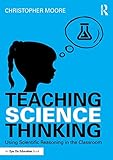Teaching science thinking : using scientific reasoning in the classroom / Christopher Moore.
By: Moore, Christopher (Professor) [author.]
Language: English Publisher: New York, NY : Routledge, 2019Description: xii, 197 pages : illustrations ; 25 cmContent type: text Media type: unmediated Carrier type: volumeISBN: 9781138237964 (pbk)Subject(s): Teaching -- Methodology | Science -- Methodology | Critical thinking -- Study and teachingDDC classification: 371.102 LOC classification: LB1025.3 | .M655 2019| Item type | Current location | Home library | Call number | Status | Date due | Barcode | Item holds |
|---|---|---|---|---|---|---|---|
 BOOK
BOOK
|
COLLEGE LIBRARY | COLLEGE LIBRARY SUBJECT REFERENCE | 371.102 M7818 2019 (Browse shelf) | Available | CITU-CL-49626 |
Christopher Moore is the Dr. George F. Haddix Community Chair in Physical Science and associate professor of physics education at the University of Nebraska Omaha, USA. He is also the author of Creating Scientists: Teaching and Assessing Science Practice for the NGSS.
Includes bibliographical references.
Teaching and learning science thinking -- What is science thinking? -- How is science thinking integrated into next generation standards? -- How do you teach and assess science thinking? -- Science thinking in the classroom -- Recognizing patterns and making connections -- What's important, what's not, and designing a fair test -- Testing our crazy ideas with experiments -- What does this evidence tell me, and do i believe it? -- Putting it all together -- Weaving science thinking into curriculum.
each your students how to think like scientists. This book shows you practical ways to incorporate science thinking in your classroom using simple "Thinking Tasks" that you can insert into any lesson. What is science thinking and how can you possibly teach and assess it? How is science thinking incorporated into the Next Generation Science Standards (NGSS) and how can it be weaved into your curriculum? This book answers these questions.
This practical book provides a clear, research-verified framework for helping students develop scientific thinking as required by the NGSS. Your students will not be memorizing content but will become engaged in the real work scientists do, using critical thinking patterns such as:
Recognizing patterns,
Inventing new hypotheses based on observations,
Separating causes from correlations,
Determining relevant variables and isolating them,
Testing hypotheses, and
Thinking about their own thinking and the relative value of evidence.
The book includes a variety of sample classroom activities and rubrics, as well as frameworks for creating your own tools. Designed for the busy teacher, this book also shows you quick and simple ways to add deep science thinking to existing lessons.
300-399 370

There are no comments for this item.